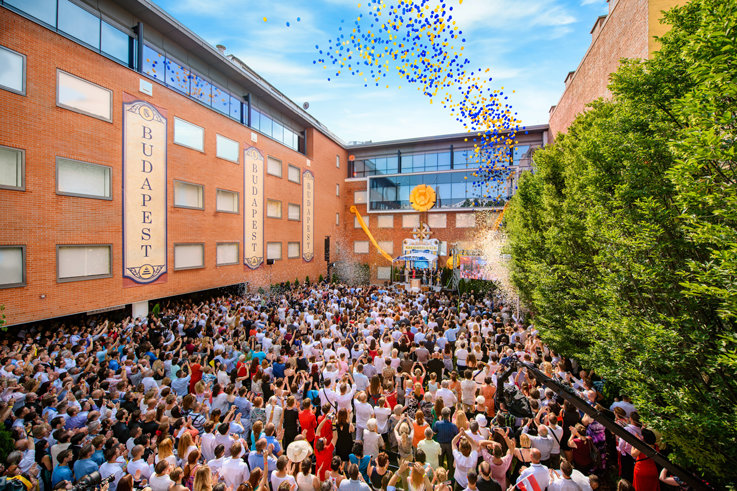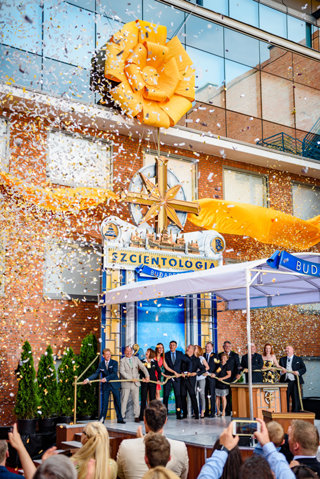
-
HOME
-
WHAT IS STANDOur Mission Our Values Our Help Contact
-
WHAT WE FIGHT FORReligious Freedom Religious Literacy Equality & Human Rights Inclusion & Respect Free Speech Responsible Journalism Corporate Accountability
-
RESOURCESExpert Studies Landmark Decisions White Papers FAQs David Miscavige Religious Freedom Resource Center Freedom of Religion & Human Rights Topic Index Priest-Penitent Privilege Islamophobia
-
HATE MONITORBiased Media Propagandists Hatemongers False Experts Hate Monitor Blog
-
NEWSROOMNews Media Watch Videos Blog
-
TAKE ACTIONCombat Hate & Discrimination Champion Freedom of Religion Demand Accountability
Celebrating Eight Years Since David Miscavige Opened the Doors of Freedom Wider in Budapest
The ancient lore tells of a magical golden stag that materialized before the eyes of two brothers who were hunting in the woods. They pursued it for many days through forests and marshlands but it always stayed ahead of them. At last, nearly dead from exhaustion, the hunters beheld the stag standing at the shore of a great river, its proud antlers aglow like a beacon. Then, suddenly, it vanished.

On checking their surroundings, the brothers saw beautiful rolling hills on one side of the river and a flat plain suitable for farming on the other. The place the stag had guided them to would become Budapest, a city divided by a river but with its people united by an inborn thirst for freedom.
In that respect, Budapest is not so much a city as an idea.
In fact, the history of Hungary itself is a chronicle of a people yearning for, grasping at, and ultimately fighting for an idea: freedom. At times, over the centuries, freedom seemed as elusive as a stag in a dark wood. Sometimes, the people of Hungary would glimpse it but then lose it. Other times, it would disappear for generations, only to reappear suddenly on the horizon, a beckoning light.
“It is said the whole world knows your city as a capital of freedom.”
Such an instance occurred barely a generation and a half ago when communism and its iron grip weakened, then limped off Hungary’s stage. Shortly thereafter, the first Dianetics book found its way into that nation, followed swiftly by thousands more falling into eager hands. Scientology groups formed, and as more people tasted freedom—true spiritual freedom—the groups became Scientology Missions. Then those Churches grew and expanded in numbers until, eight years ago today, Hungary’s first Ideal Organization, the Church of Scientology Budapest, came into being.
Scientology Founder L. Ron Hubbard defined an Ideal Org as “an activity where people came to achieve freedom and where they had confidence they would attain it.”

July 23, 2016, the day our Ideal Church of Scientology opened its doors, was a day of celebration for Budapest. Some 3,500 Scientologists and friends cheered the ribbon falling on the 64,000-square-foot edifice. Dignitary after dignitary rose before the gathered crowd to commend the Church of Scientology for its contributions to the community.
One praised the Church-supported nonreligious drug education program The Truth About Drugs, which has reached and inspired the youth of over 400 Hungarian towns and cities to lead drug-free lives. Another extolled the Church-supported literacy program, which transformed Hungary’s educational landscape and brought hope to thousands who believed the gates of knowledge had been closed to them.
Yet another pointed to L. Ron Hubbard as “the greatest humanitarian of our time” for mapping a path toward spiritual freedom that anyone can walk.
And in his opening remarks, David Miscavige, ecclesiastical leader of the Scientology religion, spoke of Hungary’s “longing for spiritual independence.”
“It is said the whole world knows your city as a capital of freedom,” he said. “Your fight to be free translates into every known language on Earth. It is also said that whenever people yearn for liberty, they become ‘citizens of Hungary.’”
And thanks to Mr. Miscavige’s dedication to making L. Ron Hubbard’s dream of freedom available to all who reach for it, since that day eight years ago, the Church of Scientology Budapest has stood as a home for all faiths and as a beacon promoting dialogue amongst those who stand united for the principles of religious freedom, human rights and the beauty of diversity.
Mr. Hubbard entrusted that dream to David Miscavige in full confidence that he would make it a reality through the creation of Ideal Orgs throughout the world.
For Mr. Hubbard’s dream of an Ideal Org went far beyond just one city or one nation or one continent. Just like the lost brothers who sought the elusive golden stag through the murky wood, we are all in this together, seeking the same thing. No matter how we say it—timidly, hopelessly, defiantly or angrily—what we all seek is freedom. Greater freedom, spiritual freedom, that permits one to fully and effectively act in pursuit of one’s dreams and happiness in harmony with others. And the end product of that, as Mr. Hubbard wrote, “is not just an ideal org but a new civilization already on its way.”








